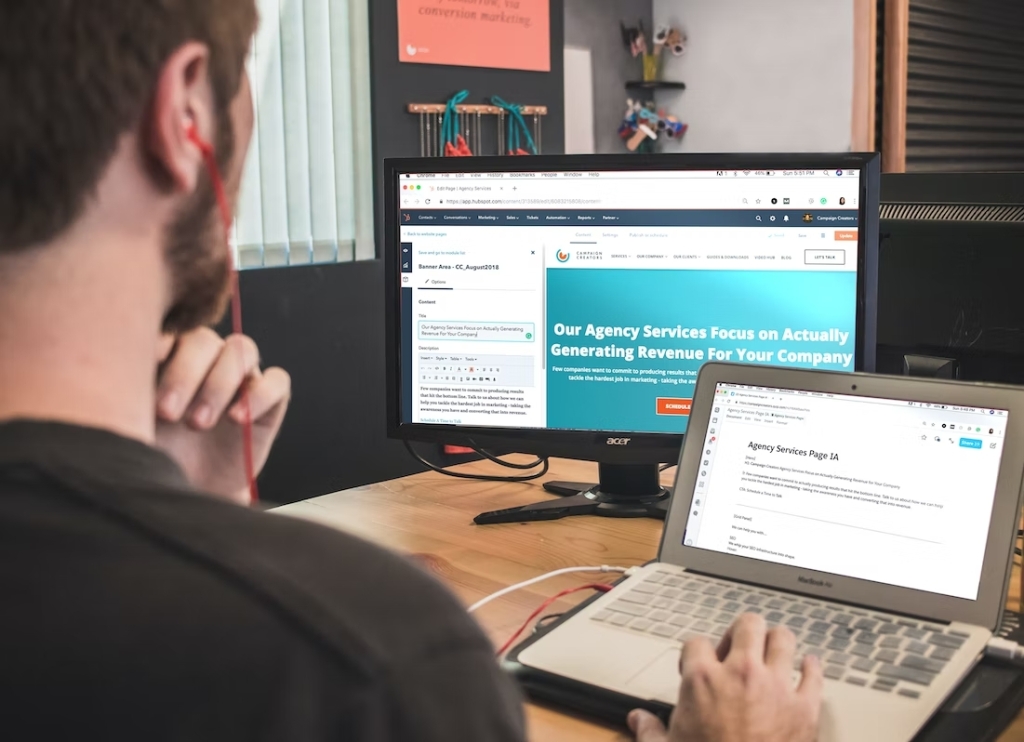What Is Email Marketing? | A Beginners Guide
What Is Email Marketing? The Ultimate Beginners Guide
Regardless of the size and type of the business, email marketing is an efficient way for businesses to ensure that they can reach out to their customers, build their brand’s reputation, and grow their customer base.

Statistics suggest that nearly 40% of B2B marketers consider email newsletters critical to their content marketing success.
Furthermore, almost 99% of consumers confirm that they check their email every day, and it is one of the most preferred ways to receive updates from brands.
When used the right way, email has the potential to deliver the highest ROI of every marketing channel, achieving a whopping $52 for every dollar spent in 2019.
These statistics indicate the importance of developing a strong email marketing strategy for any brand. Marketing your product or service offerings by email can be a fast, flexible, and cost-effective way of reaching new customers as well as retaining existing customers by encouraging repeat website visits.
If you also wish to take advantage of email marketing for your business, this is a definitive guide to walk you through the process of getting started and help you achieve success.
Here, we will discuss everything from what is email marketing to its benefits, best practices, and more.
What is Email Marketing?
Email marketing is a type of direct marketing strategy that involves using personalized emails to educate your email subscribers about your product or service offerings.
Businesses can use email marketing to convince their email subscribers to take a specific action, such as taking a product trial, making a purchase, booking a service or product demo, or registering for a business event.
How to Get Started With Email Marketing

Digital marketing is a huge topic with endless possibilities. To make it easier for you, here are the steps you can take to create a successful email marketing strategy;
a. Define Your Target Audience
An effective email marketing campaign should always begin with defining the niche buyer persona you wish to target, understanding their needs, and accordingly tailoring your email campaign.
b. Establish Your Goals and Build Your Email List
The next step is gathering context, understanding the industry stats, and establishing realistic goals. Once done, you need to build an email list or a group of users who have given you consent or permission to send them relevant content.
c. Pick an Email Campaign Type
When it comes to choosing your email campaigns, there are various options available, and trying to decide between them can quickly get overwhelming.
The best approach is to learn about the different types of email campaigns (weekly newsletter, sending out new product announcements, blog posts, etc.) and decide which is best for your audience.
d. Make a Proper Schedule
In this step, you need to make a schedule and decide how often you plan to contact your email list and inform your audience beforehand.
This will prepare your audience in advance about exactly what to expect and reduce the chances of high unsubscribe counts.
Further, it also helps build trust among your customers and ensures that you stay top of mind for your target audience.
e. Measure Your Results
Measuring your results and being meticulous about every key metric allows you to fine-tune your campaign further and help you make relevant changes to your emails that yield expected outcomes.
How an Effective Email Marketing Strategy Increases Sales and Generates a Great ROI

Data suggest that sustainable email marketing has the highest ROI (return on investment) of all forms of marketing, averaging about $36 in return for every $1 spent.
Here are some of the other benefits of email marketing that can help you generate excellent returns for minimal investment, reach vast audiences, and retain your customer base:
- Allows you to create personalized content.
- Enhances brand recognition as by consistently providing valuable content to your audience, you can ensure that they begin to recognize and even anticipate your emails.
- Improves sales. Promoting your business through email marketing also gives your audience the chance to make a buying decision or purchase right from their phone or laptop.
- Helps you build strong customer relationships by giving them the information they want directly into their inbox.
- Increases traffic to your website as emails are an excellent way to get customers to visit your pages.
Email Marketing Best Practices
In this section, we will share some of the best tips and tricks to help you achieve success with your next email marketing campaign.
-
Segment Your Email Contacts
To avoid ending up in your customers’ spam bin, segment your audience based on different variables and send each group information that is relevant to them.
For instance, you can segment your customers based on where they are in their buyer journey and accordingly design personalized email content that helps push them toward conversion.
-
Write an Enticing Subject Line
The importance of a subject line in defining the success of your email is huge. The key is to keep it short, personalized, and engaging for your audience. You can also use an emoji and say it with a smile to ensure a better open rate.
-
Add Some Urgency
Another important aspect of a successful email marketing campaign is conveying some urgency in your message. The idea is to ensure that the language you use in your email is persuasive enough (without being too pushy) to make the recipient act there and then.
For instance, you can build FOMO (Fear of Missing Out) in your audience by using time-related vocabulary such as Now, Limited time, Deadline, Act Now, Hurry, Don’t delay, Seconds, Final Sale, Once in a lifetime, Offer expires in __, and more.
-
Personalize Your Message
Personalization means making your audience feel important. Insert their names, highlight their personal preferences or congratulate them for their recent milestones (birthdays, anniversaries, etc.).
Remember that any kind of personal information, when used without being creepy, can be a huge advantage in attracting and making the audience trust your brand.
-
Give Them Something to Land On
A solid CTA can be a game changer as it gives your audience a way out of an email and land on something concrete. Decide your email goal beforehand and then try to push the recipient towards that goal.
Here are some examples you can use:
- Promotional emails: Sign up for 30% off!
- Welcome marketing email: Join our user community on Twitter and say hello!
- Content email: Scroll over to our blog to know more!
- Email invitations and surveys
- Cart abandonment: Sign in today and finish your purchase!
- e-Newsletter emails
- Lead nurturing emails
To Conclude
The benefits that email marketing offers to small businesses are immense. Mainly, it all comes down to the fact that email marketing is one of the most cost-effective yet effective marketing solutions available for brands.
Regardless of your level of experience, you can create professional email marketing campaigns within no time to ensure success and better ROI for your business.
Are you also looking to build your email marketing strategy?
Look no further than MassMailer. MassMailer offers powerful email marketing solutions to help you create, send and track emails that your customers look forward to.
Get started with your MassMailer trial today.
What Is HubSpot? | Guide to Inbound Marketing
What Is HubSpot and How Can It Help Your Business?
For any inbound marketing strategy to be successful, the importance of having the right set of tools is immense. In the absence of this, your information can be distributed across multiple websites, requiring you to manually manage the leads.

This could waste several productive business hours that otherwise could be used for other strategic tasks. HubSpot is an excellent tool to help you navigate this challenge and fuel your inbound marketing tactics.
As a powerful marketing, sales, and customer relationship management software, HubSpot allows you to accelerate your business’s growth by utilizing all three aspects and integrating with multiple different applications and third-party programs.
In this post, we explore what is HubSpot CRM and how it can help your business’s digital marketing strategy. Let’s begin.
What is HubSpot?

HubSpot is an inbound marketing and sales software that helps businesses in multiple areas, such as attracting visitors, converting leads, and closing deals.
As a leading sales, marketing, and customer service software company, HubSpot helps companies generate leads, maximize sales and grow with time.
The software offers a range of resources to achieve these objectives, including the four main Hubs (to be discussed later).
How Does HubSpot Work?
HubSpot works primarily by being connected to the organization’s website. Using the many tools that it has in its Hubs, the software help attracts, engage, and delight leads and customers. This is accomplished by:
- Using the platform to create optimized website content
- Driving the traffic to the website
- Converting the traffic to leads, nurturing the leads into customers, and offering exceptional customer support.
The best part is that HubSpot is a cloud-based CRM technology. This allows users in an organization to utilize the platform from anywhere, anytime.
Who is HubSpot for?
HubSpot, owing to its wide set of tools, can be useful for anyone running their own business or working as a marketing or sales personnel.
Some of the examples of who uses HubSpot include:
- Salespeople who wish to identify prospective leads to enhance sales
- Marketing personnel who wish to assess the performance of their marketing campaigns
- Customer service professionals who want to follow up and act on customer issues quickly
Why Should You Use HubSpot for Your Business?

Here are some of the reasons why you should use HubSpot for your business:
a. Ease of Use
The platform was built from scratch to create an easy and seamless user experience.
Being built specifically for inbound marketing ease, HubSpot gives you a unified experience across all its four main hubs. This ease of use and seamless adoption results in better business insights and satisfactory customer experiences.
b. Quick Growth
As one of the best CRM platforms out there, HubSpot has grown tremendously in recent times. The platform works as per customer requirements, thus reaching the top within no time.
c. Consistent Support
With HubSpot, you can get the most out of your CRM implementation by conveniently accessing the wide array of resources available in HubSpot Academy and a massive online community.
Core HubSpot Hubs

The four main functions of HubSpot are known as Hubs, and each of these Hubs comes with its suite of tools discussed below:
1. HubSpot Service Hub
As the name indicates, HubSpot’s service hub revolves around customer service. It has everything you need to support your customers and create a seamless experience for them.
Some of the main HubSpot service tools include:
- Robust knowledge base support
- Easy to access and streamlined helpdesk
- 1:1 video messaging, live chat support
- Detailed customer feedback surveys
- Conversational intelligence features
- Reporting and analytics to assess customer satisfaction and team performance
2. HubSpot Marketing Hub
HubSpot’s marketing hub allows you to boost your website traffic, increase conversions, and display the ROI.
It is an all-encompassing tool that allows you to automate the time-consuming processes of segmenting, nurturing, and qualifying your leads within the HubSpot CRM.
Some of the main HubSpot marketing tools include:
- Lead capturing forms
- Live chat support and chatbots
- Email automation
- Lead nurturing
- Lead scoring
- Lead qualification
- Audience segmentation
3. HubSpot Sales Hub
Similar to HubSpot’s marketing hub, the sales hub gives businesses the advantage of various advanced tools, such as automating different processes based on your sales pipeline.
Some of the main HubSpot sales tools include:
- Detailed sales dashboards
- Automated email sequences
- Managing multiple sales pipelines at a time
- Integrated emails
- Account-based powerful marketing tools
- Task management
- Centralized view of prospects
4. HubSpot CMS (Content Management System) Hub
CMS hub is the latest addition to the HubSpot team that allows you to manage your website while making the most of the various inbound marketing tools the platform offers.
It’s primarily content management software that has something for everyone and offers a customized, safe experience for customers.
Key HubSpot CMS tools:
- Build and maintain custom website pages and SEO recommendations
- Multi-language content creation, Drag-and-drop editor
- Contact attribution reporting
- Adaptive testing
To Conclude
Inbound marketing has proven to be one of the most effective options in the business world. Yet, many companies hesitate to use it because of concerns about having to use different software and/or applications simultaneously.
HubSpot helps marketers effectively navigate these challenges and simplify their inbound marketing efforts. As one of the best marketing platforms, it consolidates all your current sales, marketing software, services, support systems, etc., and puts everything into one place, on one platform.
If you are looking to maximize and simplify your inbound marketing efforts, HubSpot is your single-stop solution to help you grow your business and delight your customers.
Further, if you are looking for a robust email solution for Salesforce CRM, MassMailer is an excellent choice. The platform enables you to send unlimited emails and email alerts, verify mailing lists, start drip campaigns, build email templates, and more using the Salesforce-friendly interface.
To learn more about MassMailer, get on a free trial today.
